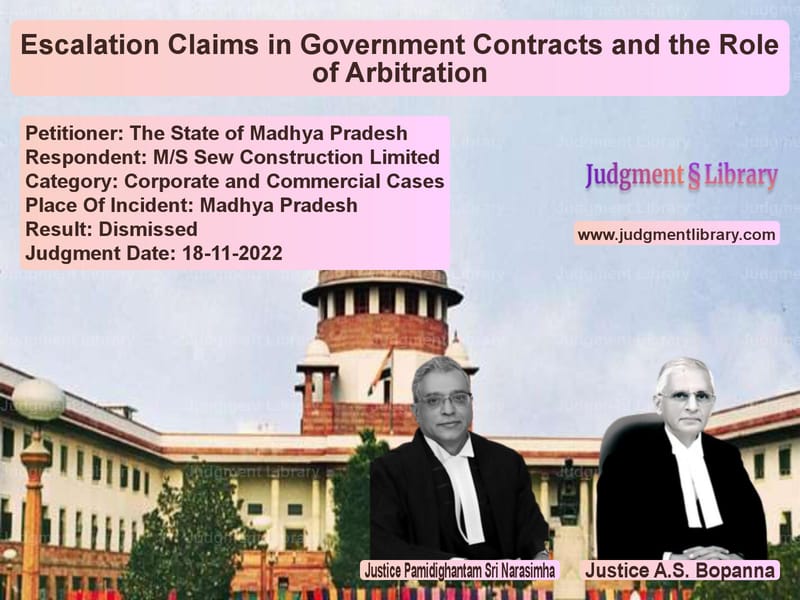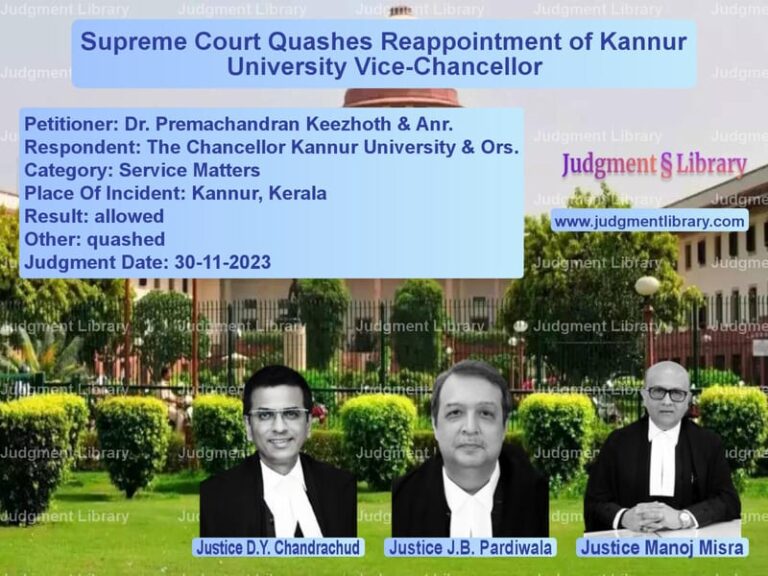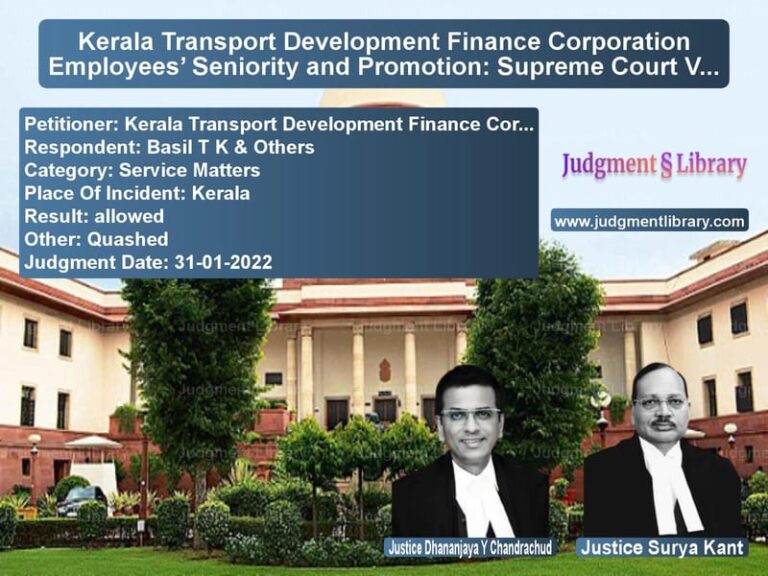Escalation Claims in Government Contracts and the Role of Arbitration
The case at hand concerns a dispute between the State of Madhya Pradesh and M/s Sew Construction Ltd. regarding the escalation of costs related to the construction of a masonry dam under a contract. The contractor, M/s Sew Construction Ltd., had requested for an escalation in costs due to the increased distance for transporting sand after the original quarry was depleted. This request was rejected by the Superintending Engineer, leading the contractor to raise a claim for escalation, which was later resolved through arbitration. The issue ultimately reached the Supreme Court, which had to determine whether the escalation claim was justified and whether the decision of the Arbitral Tribunal should be upheld.
Background of the Case
The State of Madhya Pradesh issued a tender in 1992 for the construction of a masonry dam, and the respondent, M/s Sew Construction Ltd., was awarded the contract in November 1993. The contract required the contractor to transport sand from a designated quarry, but by 2002, the original quarry was found to be depleted. The contractor requested the use of an alternative quarry, Mahuar, which was located 40 kilometers away, as opposed to the original quarry’s 20-kilometer distance.
The request for the alternative quarry was initially denied by the Executive Engineer in March 2002, but after an inspection and a subsequent report, the Superintending Engineer granted permission to use the Mahuar quarry in November 2002. However, the contractor later raised a claim for escalation in costs, citing the additional transportation costs due to the increased distance. The State rejected the claim, stating that the claim for additional lead and transport costs was not justified under the contract, which only allowed claims under certain conditions. As a result, the contractor filed for arbitration.
The Legal Arguments
The appellant, the State of Madhya Pradesh, contended that the contractor’s claim for escalation was barred by the principle of res judicata, as the initial claim for an alternative quarry had been resolved and rejected in 2002. The appellant further argued that the request for escalation came years after the rejection of the original request and that the contractor had accepted the conditions set by the Superintending Engineer, including the absence of any claim for additional costs.
The respondent, M/s Sew Construction Ltd., countered by arguing that the depletion of the original quarry was beyond its control and that the need for an alternative quarry was justified. The respondent emphasized that the increased transportation costs were a direct result of the need to move the sand from the Mahuar quarry, which was farther away. Additionally, the respondent argued that the rejection of the escalation claim was improper, as it complied with the conditions laid out in the contract, and the escalation request was made after fulfilling the procedural requirements of obtaining written permission.
The Court’s Consideration
The Supreme Court, in considering the matter, first examined the contractual clause in question, Clause 3.11(A), which governs the issue of claims for escalation. The Court noted that the clause allowed for escalation claims in cases where circumstances beyond the contractor’s control, such as the depletion of the original quarry, necessitated a change in the source of materials. The Court found that the conditions for escalation were met, as the Superintending Engineer had granted permission to use the Mahuar quarry after inspecting the site and determining that the original quarry was no longer viable.
The Court also addressed the issue of res judicata raised by the State. It noted that while the earlier arbitration had dealt with the initial rejection of the request for an alternative quarry, the subsequent escalation claim was based on a different set of circumstances—namely, the approval for using a new quarry and the subsequent increased transportation costs. The Court therefore concluded that the principle of res judicata did not apply in this case, as the previous claim was based on different grounds.
The Court’s Judgment
The Court upheld the Arbitral Tribunal’s award, which had granted the escalation claim. The Court found that the conditions for escalation under the contract were met, and the approval from the Superintending Engineer for using the Mahuar quarry constituted the necessary written order to trigger the escalation provision. The Court emphasized that the contractor had a contractual right to claim escalation under the conditions specified in the contract, and that the State’s denial of the claim was unjustified.
The Court also rejected the State’s argument that the contractor had accepted the conditions of the Superintending Engineer’s order, which did not allow for escalation. The Court clarified that the contractor’s request for escalation was valid, as it was made after the conditions of the contract had been satisfied, including obtaining the necessary written approval.
In conclusion, the Supreme Court upheld the Arbitral Tribunal’s decision, emphasizing the importance of respecting contractual terms and ensuring that the parties’ rights and obligations are upheld in the context of arbitration. The Court also reaffirmed that the principle of res judicata does not apply when the claims are based on new facts and circumstances, as in this case.
Conclusion
This judgment reaffirms the principles of contractual obligations and the role of arbitration in resolving disputes related to construction contracts. It highlights the importance of ensuring that all claims, especially those related to escalation and changes in project conditions, are made in accordance with the contractual provisions. The Court’s decision provides clarity on how escalation claims should be handled when circumstances beyond the contractor’s control arise, such as the depletion of materials from a designated quarry. The ruling also emphasizes the need to respect the terms of contracts and the procedures set forth for making claims under such agreements.
Petitioner Name: The State of Madhya Pradesh.Respondent Name: M/S Sew Construction Limited.Judgment By: Justice Pamidighantam Sri Narasimha, Justice A.S. Bopanna.Place Of Incident: Madhya Pradesh.Judgment Date: 18-11-2022.
Don’t miss out on the full details! Download the complete judgment in PDF format below and gain valuable insights instantly!
Download Judgment: the-state-of-madhya-vs-ms-sew-construction-supreme-court-of-india-judgment-dated-18-11-2022.pdf
Directly Download Judgment: Directly download this Judgment
See all petitions in unfair trade practices
See all petitions in Corporate Governance
See all petitions in Bankruptcy and Insolvency
See all petitions in Judgment by P.S. Narasimha
See all petitions in Judgment by A. S. Bopanna
See all petitions in dismissed
See all petitions in supreme court of India judgments November 2022
See all petitions in 2022 judgments
See all posts in Corporate and Commercial Cases Category
See all allowed petitions in Corporate and Commercial Cases Category
See all Dismissed petitions in Corporate and Commercial Cases Category
See all partially allowed petitions in Corporate and Commercial Cases Category







